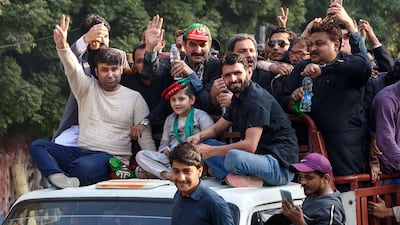Pakistan's political parties have intensified their campaigns ahead of next month's elections, but questions remain over whether the political and military establishment will allow a free and fair vote.
The country has a mixed history of democracy since gaining independence in 1947, with the military staging several coups and being accused of interfering in politics and influencing the results of elections.
The lead-up to the February 8 vote has been shaped by the imprisonment of former Prime Minister Imran Khan, who accuses the military of orchestrating his removal and manufacturing charges against him.
In 2018, the Pakistan Tehreek-e-Insaf, led by former cricket star Khan, secured a majority and formed the government.
However, Khan was removed as prime minister in 2022 after a no-confidence vote, and subsequently imprisoned for corruption. His government was replaced by a coalition of the PTI's rivals, led by head of the rival Pakistan Muslim League (Nawaz), Shehbaz Sharif.
Khan, currently serving a sentence at Adiala Jail, said on Tuesday that he is being punished after he exposed a purported conspiracy against his government by former army chief Gen Qamar Bajwa.

His party was recently barred from using the cricket bat as its electoral symbol, and says its members have been harassed and arrested.
“PTI workers were arrested and their electoral symbol, a bat, was snatched from them. This is clearly a victimisation of PTI,” central PTI leader Shaukat Yousafzai told The National.
Mr Yousafzai accused the PTI's major rival, the PML-N, of soliciting the support of the establishment.
The PML-N appears to be experiencing a resurgence since its leader and former Prime Minister Nawaz Sharif returned to Pakistan after four years of self-imposed exile last year. He has since been granted bail in various corruption cases that had prompted him to leave the country.
“The way Nawaz Sharif returned to Pakistan and his exoneration in various cases show that there is a deal between PML-N and establishment,” Mr Yousafzai said.
Neither Mr Sharif nor Khan are officially eligible to run for a seat in Parliament due to the cases against them, but their treatment by the courts has prompted accusations that the establishment favours Mr Sharif's PML-N.
The PML-N denies these accusations and accuses the PTI of rigging the vote in 2018.
“Only PTI is levelling this allegation [that the establishment backs PML-N], but this is not true,” PML-N Secretary General Ahsan Iqbal told The National.
Mr Iqbal, who served as Minister of Interior and Minister of Planning and Development in the former PML-N government, said his party was in a strong position and accused the PTI of having rigged the vote in 2018.
“In 2018, the Pakistan Tehreek-e-Insaf had rigged the elections with the support of Pakistan’s [security] establishment, this is why they had formed the government,” Mr Iqbal said.
Mr Yousafzai said that while the establishment may have supported the PTI “to some extent in the past,” the arrest of PTI party members this time around was unprecedented.
“The establishment may have a role in the elections in the country and maybe the PTI was supported to some extent in the past, but the PML-N workers were not harassed the way our PTI leadership is being tormented. This is unfair,” he said.

PTI leader Barrister Gohar told reporters that the party would file a review petition against the Supreme Court decision stripping the PTI of its symbol, a cricket bat.
“We are also going to upload PTI candidates’ electoral symbols on social media soon. But depriving a party of its symbol is totally an injustice,” he said.
It remains to be seen whether the army intervenes directly in the vote on February 8.
Mr Iqbal said he did not believe the army would meddle with the vote this time, after it backed and then subsequently fell out with the PTI last time.
“This is why we believe that now there is no role of the army in the elections and the balloting is going to be fair this time.”

PML-N win likely but coalition possible
Analyst Dr Sarfraz Khan said the PML-N seems to be the favourite party of the establishment this time, and is likely to form the next government.
However, he added, this time the establishment will make efforts to secure coalition governments in both the centre and the provinces.
“After bringing Imran [Khan] into power in 2018 and subsequent tension with his party, the establishment may not like to bring a single political party into the government with absolute majority this time. This is why I believe coalition government is likely now,” said Dr Khan, a retired university professor.
“During the last four decades in Pakistan, the establishment has influenced elections and one can guess about future government even before the balloting.”
Dr Khan suggested that political parties could sign a charter to limit the role of the establishment within the constitution, modelled on the Charter of Democracy signed by Mr Sharif and Pakistan People’s Party leader Benazir Bhutto in 2006.

